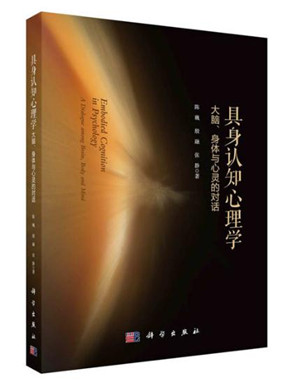Role of body in embodied cognition
Author : YU FENG Source : Chinese Social Sciences Today 2023-03-09

Embodied Cognition in Psychology: A Dialogue Among Brain, Body and Mind
Coauthored by Chen Wei, dean and professor from the College of Education at Shaoxing University, among others, Embodied Cognition in Psychology: A Dialogue Among Brain, Body and Mind, uses a perspective of skepticism to outline how embodied cognitive science surpasses the first generation of cognitive science. Drawing from the themes of history, theory, experiment, and future, it delineates past and present paradigms of the second generation of cognitive science, embracing the basic framework of interdisciplinary challenges amid questioning.
The second generation of cognitive scientists’ criticism of classical cognitive science centers on the fact that the latter places all cognitive resources within the brain and interprets cognitive processes as the mental representation—computation model. Although criticisms come from various fields such as artificial intelligence, neuroscience, linguistics, and phenomenology in continental philosophy, they all argue that mental representations inside the brain are inefficient and too costly to compute. In real biological systems, the amount of information received by the body is far greater than that received and processed by the brain from any environment.
The body can not only see, hear, and touch, but also constantly receive proprioceptive and interoceptive inputs. For example, the unique binocular construction and relative spacing of human eyes directly shape specific depth perception abilities. In perceptual activities, the movement of the body also affects the subject’s location of horizon and information extraction. Why then do we ignore the body’s role in cognition and merely emphasize internal mental representations? Embodied cognition has become a common concern in cognitive psychology, neuroscience, experience-oriented phenomenology, and philosophy of mind, reflecting the theoretical consensus of different disciplines on the topic.
The book is unique in advocating “a turn to an interoceptive embodied cognitive science,” which represents an effort to realize the process of self-understanding from fragmentation to a complete unity. Introducing interoception as a covariate into embodied cognition is an important step in this process. Over the past decade, the central status of embodied programs in cognitive science has gained increasingly wide acceptance. However, the unity of embodied body itself is still controversial in numerous academic literature. American psychologist Margaret Wilson summed up the embodied cognitive science movement into six views: cognition is situated; cognition is time-pressured; we off-load cognitive work onto the environment; the environment is part of the cognitive system; cognition is for action; and offline cognition is body-based. Specifically, different cognitive scientists have displayed varying attitudes towards the tension between these claims.
Yu Feng is an associate professor from the Department of Philosophy at East China Normal University.
Ye Shengtao made Chinese fairy tales from a wilderness
Ye Shengtao (1894–1988) created the first collection of fairy tales in the history of Chinese children’s literature...
-
How northern ethnicities integrated into Chinese nation
2023-09-18
-
Mogao caves
2023-09-12
-
Mogao Grottoes as ‘a place of pilgrimage’
2023-09-12
-
Time-honored architectural traditions in China
2023-08-29
-
Disentangling the civilizational evolution of China
2023-08-28
-
AI ethics in science fiction
2023-08-23














 2011-2013 by www.cssn.cn. All Rights Reserved
2011-2013 by www.cssn.cn. All Rights Reserved